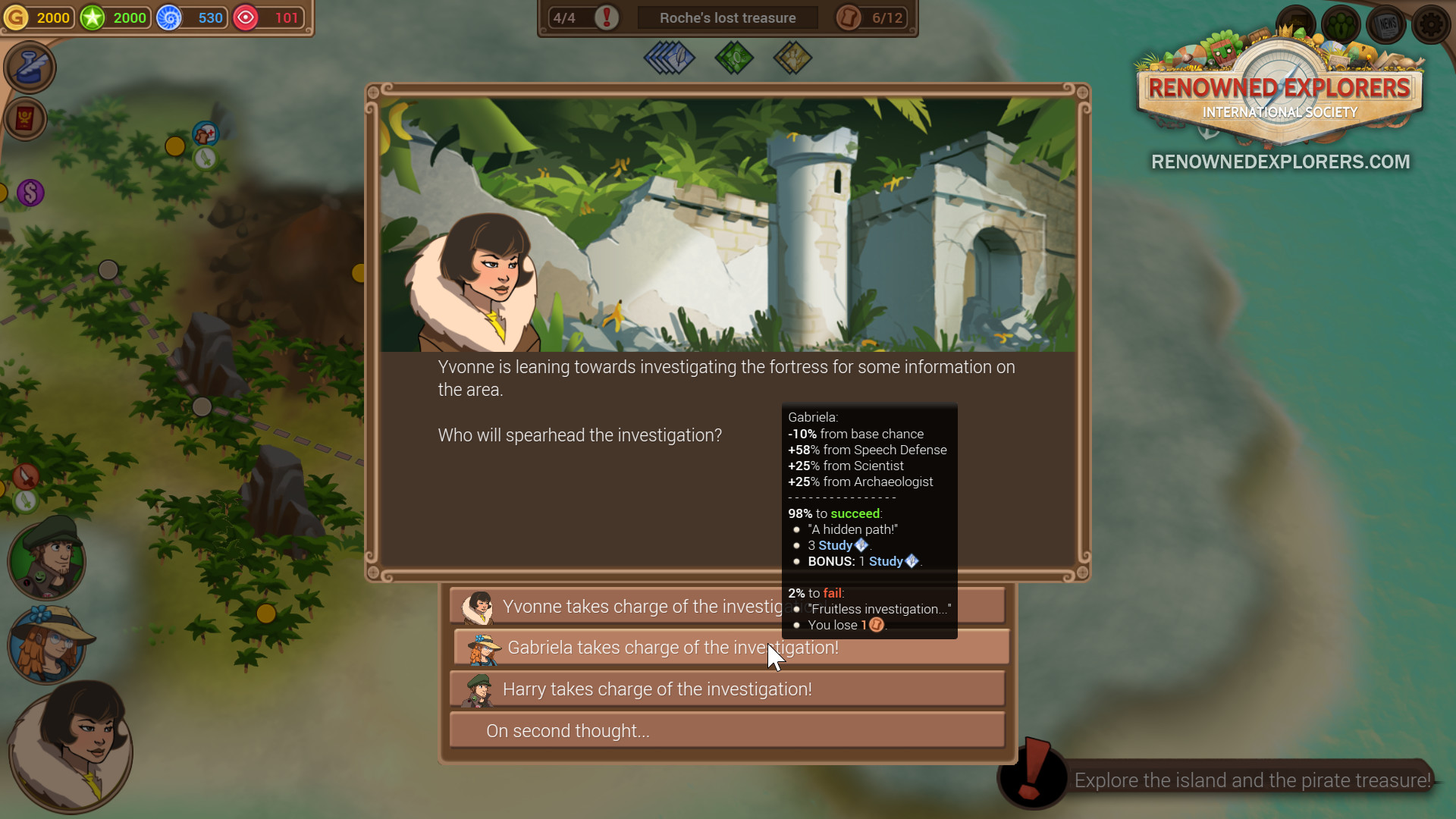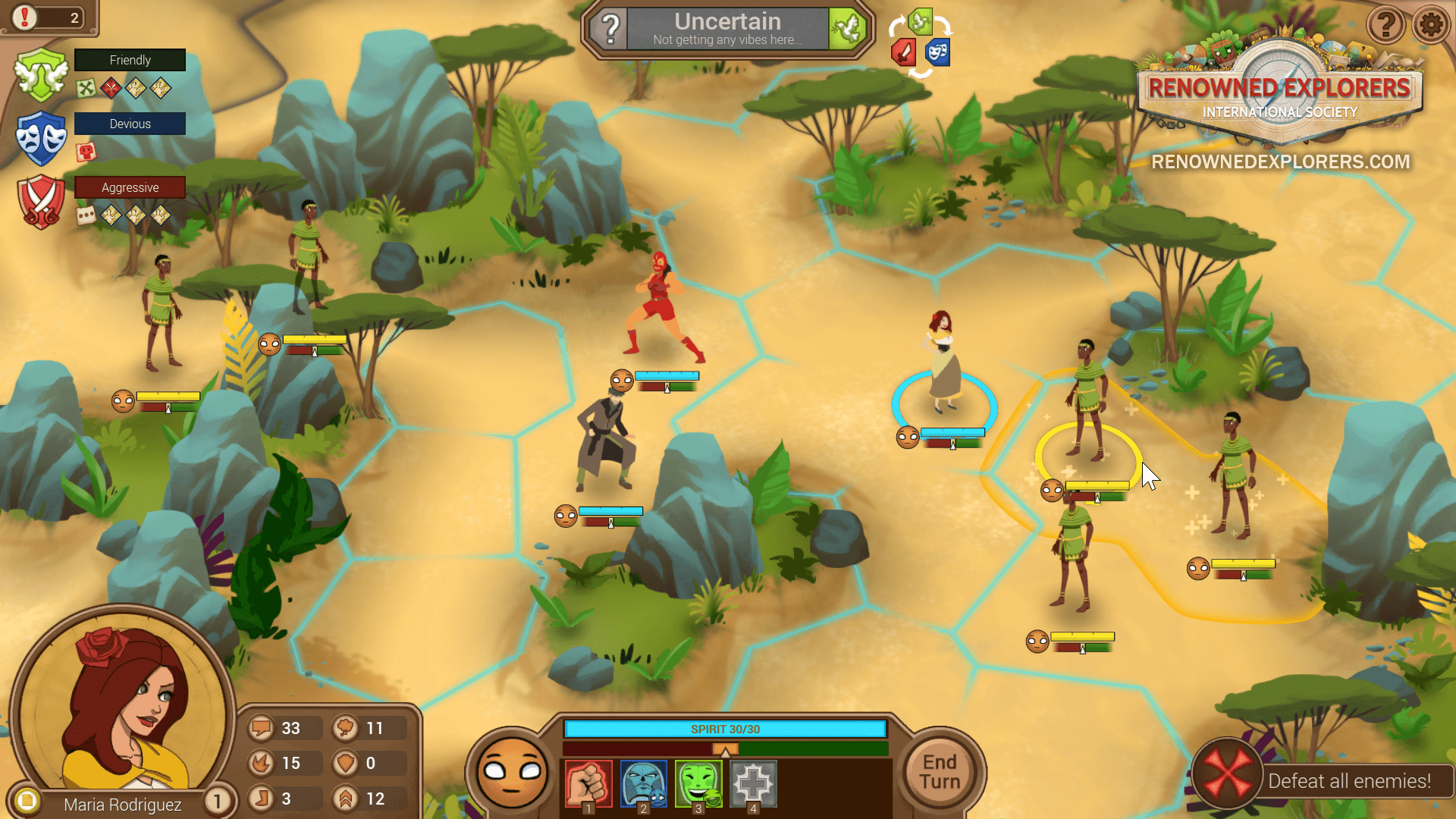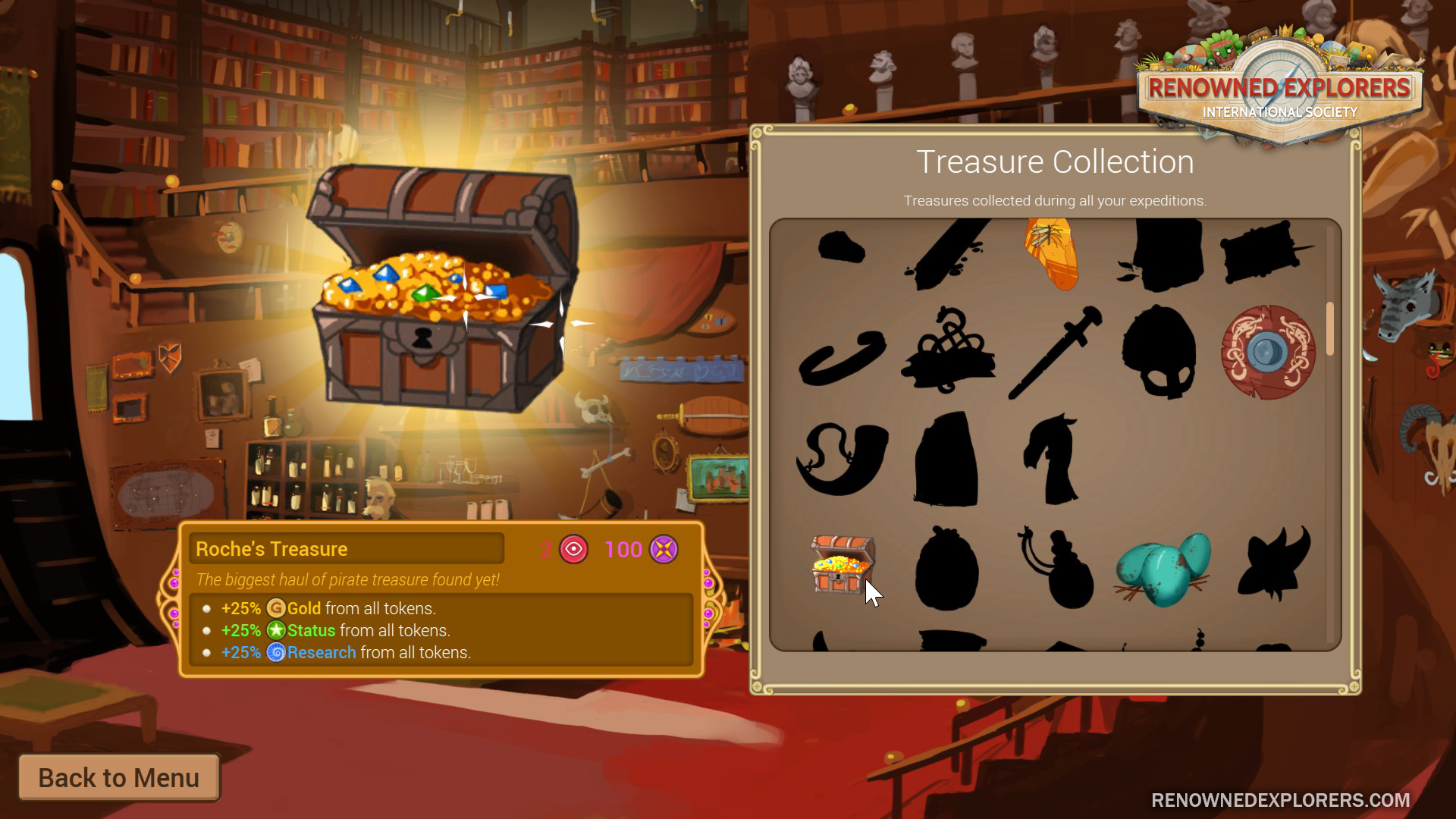The term “permadeath” is a bit of a red flag for me. Nothing makes me run faster from an otherwise intriguing game, other than maybe zombies or overly simplistic pixel art, than seeing that term tagged on a game in Steam. Or simulators, those usually suck. And horror games, which I always find boring. Multiplayer games are another one, those games are just too repetitive for me, especially with all the douchebags online. Oh, and don’t get me started on survival games.
Okay, so there are quite a few games I don’t like, but chief amongst them are those employing permadeath. The premise is one I love. You only get one life, and if you die, you die. Game over, no continues, don’t pass go, don’t collect $200. Why should you collect money for passing a square arbitrarily marked with ‘Go’ anyway?
Then one day, I discovered a curious little game called Renowned Explorers: International Society. Here was a game with permadeath that I eventually fell in love with. Renowned Explorers fixes one of the biggest problems the mechanic has always had, and in that regard, it reminds me of a game that may sound a little… odd.
Player Failure
The gaming industry has a funny way of taking great ideas and utterly ruining them within a matter of months. Whether it’s Early Access, DLC, or pre-orders, most developers or publishers have proven they can’t be trusted with a good idea. The same goes for permadeath.
The base premise is ingenious. Since their inception, video games have never really figured out how to handle player death. Even notoriously difficult games like Dark Souls or Barbie Horse Adventures always send you back to the last checkpoint whenever you die, which are usually pretty close relative to where you started the game. Setting aside the “realism” debate since it is a bit silly, it’s always made even the most difficult games relatively easy since you could immediately return to whatever challenge last killed you and brute force your way through.
 One of the few games I think that handled player failure well was Heavy Rain. If you ever screwed up, then the game kept going and you had to live with your mistake. If you were stupid unlucky enough to die, the game carried on still, minus one of the four player characters. That’s what the game did so well – forcing you to deal with and confront your mistakes, not slap your across the wrist whenever you screwed up and demand perfection like so many other games do.
One of the few games I think that handled player failure well was Heavy Rain. If you ever screwed up, then the game kept going and you had to live with your mistake. If you were stupid unlucky enough to die, the game carried on still, minus one of the four player characters. That’s what the game did so well – forcing you to deal with and confront your mistakes, not slap your across the wrist whenever you screwed up and demand perfection like so many other games do.
Dice, Dice, Baby
I always hoped that permadeath would operate on a similar principle. Obviously the game couldn’t continue if you screwed up because you’d be dead. Instead, I always thought these games should force the player to make decisions and then live (or die) with them. That’s always been the case in the gameplay department; do you use your last remaining bullet now or save it? Do you take a chance on a random dice roll knowing you have a 54% chance of permanently crippling your character?
But I’ve never seen a game that fully carries through on that promise in terms of narrative. If you do screw up, all that effects are your stats. The same goes if you do something right. It’s still the same game cast in a different light.
 Take other popular games featuring permadeath for example, mostly roguelikes. FTL: Faster Than Light was a huge hit back in the day. You’re on a spaceship, running away from rebels who want you dead. If you were too slow, you’d get swarmed and would likely die. But that’s just it. All you’re doing is running, no matter how well you do, all you can do is run. Want to turn around with your 10 crew members and super badass weapons and fight your way to the enemy commander, knowing screwing up with mean instant game over? Too bad.
Take other popular games featuring permadeath for example, mostly roguelikes. FTL: Faster Than Light was a huge hit back in the day. You’re on a spaceship, running away from rebels who want you dead. If you were too slow, you’d get swarmed and would likely die. But that’s just it. All you’re doing is running, no matter how well you do, all you can do is run. Want to turn around with your 10 crew members and super badass weapons and fight your way to the enemy commander, knowing screwing up with mean instant game over? Too bad.
How about Darkest Dungeon? Your job recruit adventurers to cleanse your family’s estate of demonic… demons. You do this by hiring adventurers, some of whom can develop quite severe mental illnesses fighting these hell spawns. But again, that’s all. They can get sick and they can even die, but you’ll always be able to recruit new adventurers to replace them. Sure, the greenest daisy plucked off the discount adventurer table won’t be as good as your grizzled veteran of many in-game years, but you can still get by. There’s little threat of actually losing your mansion if you grit your teeth long enough.
In all of these games, the permadeath doesn’t actually matter all that much. You still have to get to the end of the game or you lose. That has always been my problem with permadeath – games don’t take full advantage of it. You die, its game over, the end, try again. It’s not the end of a story or the end of your character’s life, it’s merely the end of your playthrough. But Renowned Explorers actually follows through with its brilliant story mode.
I Just Died in Your Arms Tonight, Over and Over and Over Again
Heavy Rain was all about story. It might not have been a good one, but that’s where the focus was. That’s why this mechanic worked so well. The game was designed with every possible outcome in mind. It weaved the story around the outcomes that you got.
But most roguelikes feature little in the way of story or narrative, instead opting for more traditional tests of combat prowess. That’s where Renowned Explorers sets itself apart. There’s a goal other than simply staying alive.
 The conceit of the game is that you’re an explorer searching for valuable, ancient treasures. You’re not just playing for high scores though. You’re in a race with nine other explorers to see who can earn the most money. But it doesn’t end there like Curious Expedition does. Your biggest rival is a character named Rivaleux, a smug asshole who insults you at every turn, steals your first treasure in the game, and even sends his goons to fight you early on. You encounter him again at points throughout the story, and you decide how you get to deal with him and his team.
The conceit of the game is that you’re an explorer searching for valuable, ancient treasures. You’re not just playing for high scores though. You’re in a race with nine other explorers to see who can earn the most money. But it doesn’t end there like Curious Expedition does. Your biggest rival is a character named Rivaleux, a smug asshole who insults you at every turn, steals your first treasure in the game, and even sends his goons to fight you early on. You encounter him again at points throughout the story, and you decide how you get to deal with him and his team.
This creates incentive to not only beat the game and stay alive, but to do the best you can to beat Rivaleux. You have to balance being conservative enough to stay alive with taking enough risks with collecting the best and the most treasure. That is why Renowned Explorers caught my eye, this isn’t a game about just surviving permadeath for the sake of it, its about exploring the world and beating your opponents. Permadeath here acts as more of a garnish than the main course, and it’s for the best.
That’s not to say Renowned Explorers is a perfect game. But if you want to hear more about it, you’ll have to watch the video above, and subscribe to From Indie With Love’s YouTube channel for more just like it.



